Over 16 million Americans served in the armed forces during World War II. These members of the military might be male or female, from any level of society, as young as 15 or as old as 72, serving anywhere from Greenland to New Guinea.
But if you were the average frontline G.I., you would fit the following description.
You are a 26-years-old white male with nine years of education, who comes from New York and is named John. You were drafted into the army and are now a rifleman in the infantry with a rank of private.
Back home, you have a wife and at least one child hoping for your return.
You are five feet, eight inches tall, and you weigh 144 pounds. During your basic training, which you received at Fort Benning, GA, you gained 5 to 20 pounds and added an inch to your 33 ¼” chest.
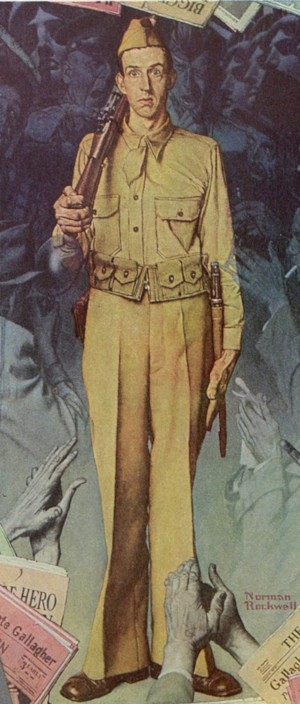
Before you were shipped out, you were able to pass the Army Ground Forces test, which involved a minimum number of push-ups, pull-ups, a 70-yard run carrying a man of equal weight on your back, and a four-mile march in 50 minutes.
During that march, you’d probably carry a full combat back pack, which contains toiletries, socks, and personal items. You’d also wear a cartridge belt, to which you’ve hooked your first aid kit with battle dressings, a bayonet, a canteen with mess kit, and a collapsible shovel. Depending on your unit, you might also carry a cargo pack that holds a two-man tent, tent pins, and blanket. And you’d be wearing a helmet. Altogether, it is the same 64 extra pounds you carry in the field — plus your ten-pound, .30 caliber, semiautomatic Garand rifle.
When hungry — and you’re almost always hungry — you prefer cooked meals, referred to as “A” or “B” rations. But you usually get “C” rations, which are ready-to-eat canned individual meals. Each C ration contains canned meat, biscuits, powdered coffee, sugar tablets, chewing gum, four cigarettes, matches, and toilet paper.
When the war is over, you’ll want out of the army as quickly as possible. You’ll return home, where you hope to get your old manufacturing job in a factory, which earned you $200 a month. But right now, you’re earning just $50 a month, and you’re sending at least half home to your wife. You have little use for money, anyway, unless you like playing poker or craps for cash.
You’re out on the front lines this month, somewhere near the French town of St. Lo. Your unit is fighting to break out of the German encirclement of allied forces that have moved inland from the Normandy beaches.
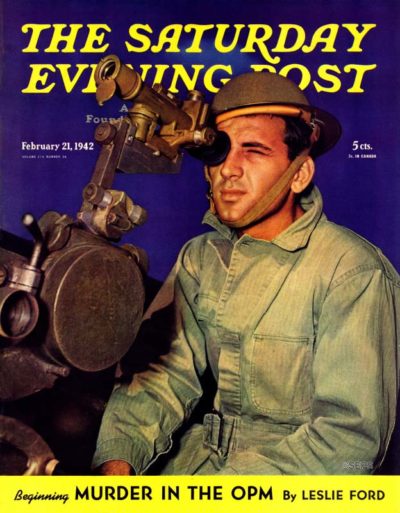 |
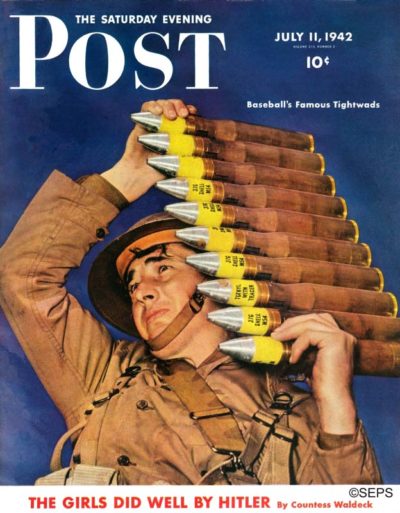 |
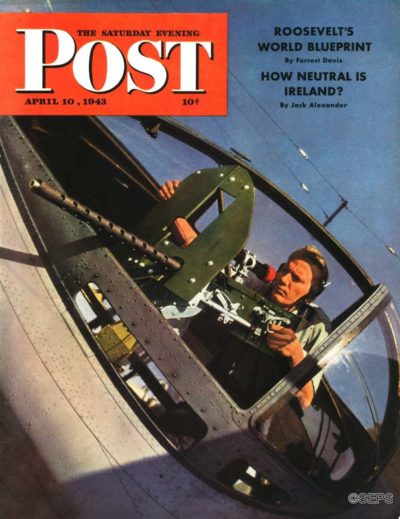 |
| Photos of World War II soldiers from our covers: February 21, 1942 (Rudy Arnold), July 11, 1942 (Rudy Arnold), and April 10, 1943 (U.S. Navy) | ||
You haven’t got into many firefights with German troops. Most of the work of breaking through enemy defenses is done by the artillery.
You feel you’ve already done your share in the war, but you’re ready to do more. Nothing, you believe, is more important than what you’re doing in this war. You believe Americans back home could do more to help the war effort. And you think some businesses have selfishly used the war to their benefit.
You’re very proud of your unit. You think your officer would do anything they asked you to do. You admire their courage and coolness. You also admire the guys in your unit who “show guts” and disregard their personal safety.
You think getting a dishonorable discharge is one of the worst things that could happen to a man.
When the going gets tough, you remind yourself that you can’t let down the other men in your outfit. You also pray. Combat experience has increased your faith in God and made you more religious.
You’re a fairly compassionate guy. You think men who went AWOL from the battle front “probably couldn’t help it.”
You want to see German leaders punished, but not ordinary Germans. To you, the German P.O.W.s appear to be “men like us. It’s too bad we have to be fighting them.”
Your biggest wartime worry are the Germans’ 88 mm anti-aircraft and anti-tank guns.
Your biggest postwar worry is whether you and your wife will get along together as well as before you entered the service.
You will not be killed in this war. In fact, you will return home without even being wounded.
Featured image: U.S. Army paratroopers (Department of Defense)
Become a Saturday Evening Post member and enjoy unlimited access. Subscribe now
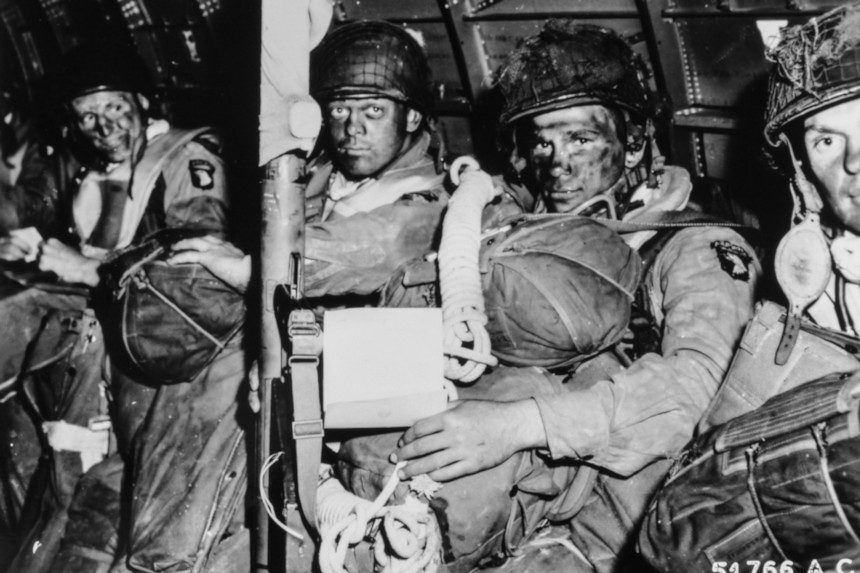

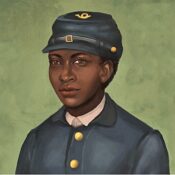
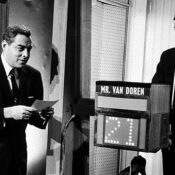
Comments
My grandfather was 82nd airborne, I co. 3rd bn . Volunteered for it. Served in Sicily, Salerno, Anzio and Holland. Managed to make all the way to Holland without getting wounded until the waal river crossing. After eliminating enemy positions on the river at Nijmegen he was shot in the wrist and shoulder. God bless these men and women.
Interesting, my dad was from Tarboro, NC, and was 18 or 19. I knew little about him because he died from wounds received during The Deadly Boot Campaign, jumping out of a perfectly fine airplane.
My dad was drafted out of Daly City,Ca. Dental technician by trade. He served in the 42nd Rainbow division, 222nd division. Got a purple heart and bronze star, was in Nordwind battle, pushed on through Germany..ended up as occupiers in Austria until shipped home…his unit recieved the Presidential Citation.
The Sherman was certainly inferior to both the German & Russian tanks’ insofar as a 1 to 1 battle weapon was between either of them was concerned, but the reality of a war half-way across the planet requires different engineering considerations, size, and weight being first among equals.
You forgot to mention that the average GI would most likely bring home a souvenir Luger or P38 pistol, German helmet or flag or Japanese Samurai sword or battle flag depending on which theater he served in. “The British and Russians fought the war for their survival, the French for their honor and the Americans for the souvenirs!”
My great grandfather was in Gen. Patton’s tank division. I couldn’t be more proud of him. For him to come back in one piece after being in a Sherman tank with armor as thin a papier-mâché, I’m impressed. Especially, serving under Gen. George S. Patton. My great grandfather was very humble & didn’t look at it as anything but serving his country.
My dad signed up in 43 was going to NYU to be an engineer, found himself in the 104 infantry division, wounded in France. He turned 21 at the start of the Battle of the bulge. He was from the Bronx, He met my mom at the end of the war at a USO in Seattle, she was a WAVE in the Navy. They are together at Arlington, so proud of my parents, God bless them!!!
My dad was one of the GI’s…. wounded. At St.Lo..France. he received the Purple Heart..for helping the other men.
These historical documentary are particularly important today so that we Americans can have an insight on the extremes that took place on either side of order and decency. It is important that we all become active in our beliefs, but at the same time be civil to those who disagree with us. That is what has made our democracy great. Our nation must be united in its diversity. Diversity is not divisive. The divisive component is those of us who play God and take a posture of being judgmental.